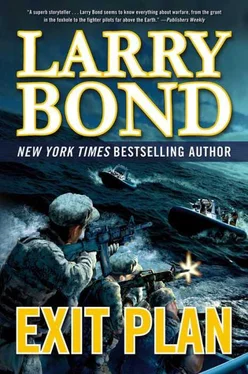The two soldiers quickly assembled a wooden barrier, blocking the road. They placed battery-powered lanterns on each side, reflecting brightly off the painted wood. There wasn’t a lot of room on the shoulder, and the ground on both sides was uneven and rutted.
While the soldiers worked, Sistani checked a portable radio and flashlight, then handed them to Ostovar. “Repeat your orders.”
Ostovar came to attention and recited, “Stop all traffic and check identity documents. I’m supposed to watch for two fugitives—” He stopped and pulled a paper from his shirt pocket, “—named Akbari and Naseri. They may have accomplices and are dangerous.”
The private had read the last part off the paper, but Sistani was satisfied. “And if you spot them, or have any trouble?”
“Use the radio,” Ostovar answered.
“And when do you use your rifle?”
“Only if I’m shot at.”
Sistani nodded. “Good. You’ll be relieved in an hour.”
The lieutenant and the corporal walked back to where the rest of the squad was working. Looking back, he could see Ostovar, nearly dwarfed by his KL assault rifle, standing alone with an oversized sawhorse across the highway.
“Sir, shouldn’t we leave two men at the roadblock? He can’t stop anybody by himself.”
“Let me worry about that, Corporal.”
“Yes, sir.”
Sergeant Zahedi had already set up one man on a low hill as a lookout, while others organized equipment or made positions for themselves in scrapes in the rocky ground.
Sistani climbed to the top of the rise. The lookout lay prone, reasonably well concealed, under a camouflage smock that would keep him warm while it masked him from observation. Using his own glasses, the lieutenant could see the highway for several kilometers in either direction. It ran almost straight east and west here, and while the ground was uneven, there was no place that offered a covered approach on his position. Aside from the paved road, there was no human mark on the land — no buildings, not even a power line. Private Ostovar’s checkpoint was as bright as a lighthouse in the darkening landscape.
“Lieutenant, headlights.” Private Peyman was on lookout duty, and he pointed east. The lights resolved into a civilian car, slowing to a stop as it approached the checkpoint. Ostovar, rifle slung, leaned over the driver’s side window for a minute, then stepped back and swung the barrier out of the way. According to headquarters, the fugitives they were watching for would come from the west, but they had ordered all vehicles to be checked, whatever direction they came from.
Sistani walked back down and called to Zahedi. “That’s a good position up there. Take Alizadeh off the rotation and put him up there along with the lookout. Having our best shot on overwatch should make whoever’s on duty at the roadblock happier. And make sure his position is as well camouflaged as the others.”
“Yes, sir,” Zahedi said, then continued by asking, “Sir, how long will we be here?”
“Third squad will relieve us at 0600 tomorrow morning, and first squad will relieve them at 1800 tomorrow night. We’ll take our turn again at 0600 the morning after that.”
“And how long will this last?”
“Until they tell us to stop, Sergeant.” As they talked, the two walked the squad’s positions, pointing out small tasks or praising a soldier’s work. Sistani smiled. “I’ve never seen the major move so fast as when he got that order. We drew this post because we were the squad on duty. Right now the major is mustering the rest of the battalion and passing out the rest of the assignments, all with the colonel gone. I’m glad to be away from that circus.”
“Is it true that these are American assassins? That they’ve wiped out two platoons?”
“More rumors, Sergeant? Don’t repeat them. Whoever the fugitives are, a Basij patrol is missing without a trace. Headquarters said to be ready for anything.”
Sistani looked around. “And tell the squad to get this place organized. What if the major saw this? We’ve been here half an hour and already it looks like we lost a battle.”
South of Baverdan, near Highway 96
1900 Local Time/1600 Zulu
Harry was driving, a pair of night-vision goggles draped over his eyes. Shirin still rode up front, with Yousef on the far side. The windows were open enough to keep the air from getting stuffy, as well as to help Harry stay awake. Yousef was dozing, as much as the bumpy ride allowed.
They’d turned off the highway fifteen minutes earlier, and slowed to a crawl as they felt their way along an unpaved track. Ramey, navigating with Lapointe’s assistance, was taking them around a roadblock south of the town.
At Michigan’s direction, CENTCOM operators were using a UAV to scout ahead of the truck. The UAV’s images were streamed directly to Lapointe through the remote video-receiver function on the laptop. This God’s-eye view gave enough warning to let them avoid the roadblocks.
Unfortunately, that meant using some secondary and a lot of tertiary roads. The UAV had spotted roadblocks near most towns, a sign that the hunt for them had gone to a much higher level.
In the back, while Ramey and Lapointe navigated, Jerry and Phillips cleaned weapons and reorganized their gear. Phillips even drilled Jerry again on the SCAR rifle. With the rough ride, sleep was impossible. Dinner had been cold MREs, Harry and the two Iranians having theirs passed up to the cab.
Shirin, squeezed in between the two men, chewed mechanically on something she hadn’t bothered to identify. It might have tasted better hot, but she didn’t care. Beyond exhaustion, she didn’t dare close her eyes. Even with them open, images from the fight flashed in front of her, as if projected onto the dark windshield. What would her dreams be like?
The first battle had been over in moments. But this time, there’d been enough time to be really afraid. She and Yousef had lived in fear for years, but that had been an abstract thing. This had been immediate. She’d heard bullets snap overhead, felt pieces of rock and dust fall on her.
This was Yousef’s first time in combat, as well. He looked thoughtful, maybe a little sad. “Yousef, I thought you were very brave today.”
“I’m glad we are safe,” he responded in Farsi. “I keep on thinking about the men we killed. They had families. They were doing their duty”
“You can’t do that,” Harry told him. “Whoever they were, when they fired a weapon at us, they had to die. We didn’t want the fight. They could have walked away and we would’ve let them. They got what they deserved, no more, no less.”
“You mean I should ignore my feelings.” Shirin was surprised. Yousef’s tone was thoughtful, certainly not hostile.
“I mean, put them in perspective. If we hadn’t killed them, they would have killed you and your wife, which would have led to many more deaths when the Israelis attack. Taking those soldiers out was necessary to our mission. It’s as simple as that.”
Shirin asked, “Have you killed many men?”
The American paused for a moment before answering. “That’s not how I think of it. I don’t keep count. I’ve been on two other deployments, and both involved combat.”
“How long is a ‘deployment’?” Shirin asked.
“Usually five to six months. It depends. We spend a lot of our time training and on exercises, then deploy for a while.”
“So you’ve seen a lot of fighting,” Shirin said.
“It doesn’t matter how many fights someone’s been in. What matters is being ready for the next one.”
“And the feelings? Do they go away?” Yousef asked.
“They become more familiar. They never go away.”
Читать дальше












